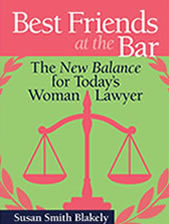As a young lawyer, a business plan may be the farthest thing from your mind. Billing hours, making your numbers, trying not to look stupid to the partner and, well, just surviving in law practice in the early years are what occupy you. I understand and remember.
But, don’t dismiss having a business plan as some other-worldly exercise that is not worthy of your time. It is more than worthy.
I have been preaching — yes, preaching — to young women lawyers about the importance of career plans for over a decade, and business plans are the same thing. All of you, male and female lawyers alike, need to have them. It is pretty simple: Where do you want your career to go, and how do you intend to get there?
Over the years I have emphasized creating career plans based on values. You have to identify the things that you value and do not want to sacrifice on the altar of a workaholic lifestyle, for example. Those values include questions about family, children, making a difference in your community, and doing work that interests you. Your plan needs to contemplate what legal setting works best with your values.
Your career plan — or business plan — is not going to look like anyone else’s. It is unique. It reflects who and what you are, and having it gives you confidence. It will be tweaked many times over the years, and that is the beauty of a plan that allows for flexibility and change. Once you have it, put it aside and concentrate on being the best lawyer you can be. That will give you valuable bargaining chips down the line. And from time to time revisit your plan and revise it as needed. Nothing is written in stone.
Now, my preaching is validated in an article that I want all of you to read. It is part of a series of articles by Lateral Link. As the name implies, the professionals there specialize in lateral movement among lawyers. But, even if you are not looking to switch jobs, the concepts addressed in the article are worth reading about. Here are some of those concepts:
- Why a good business plan takes time;
- How your business plan can be designed to highlight a key skill or specialty;
- The role of substance and business development skills in your business plan; and
- Uses for your business plan — now and in the future.
These are all important things to think about. Sure, the objective of the article is to attract young lawyers to the Lateral Link mantra, but the advice can be used more widely to get you in the right mindset for taking your career seriously.
Planning is just that. It is not taking action. It is planning for action and getting all your ducks in a row to act in your own best interest and protect your future. It is serious business, but it does not have to be taken seriously to the point of creating stress. Relax and start to think about your future in a strategic way.
Have fun with it.













